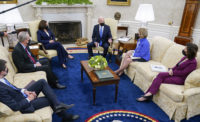When results are in from the Nov. 2 elections, they are widely predicted to show Republican gains in the House and Senate. Election analysts project that the GOP will win a majority in the House and also pick up Senate seats but not enough to wrest the majority from Democrats. What already was shaping up as a difficult year for the struggling construction industry promises to be even more difficult, as the likelihood of passing strong infrastructure spending measures would be even more remote.
Those bills include the delayed reauthorization of the Safe, Accountable, Flexible, Efficient Transportation Equity Act: a Legacy for Users, an overdue aviation bill and fiscal 2012 appropriations.
John Doyle, special counsel with law and lobbying firm Jones Walker LLP, says, “Next year on the spending side is going to be the toughest year that any of us have seen in a long, long time.”
Jay Hansen, National Asphalt Pavement Association (NAPA) vice president for government affairs, says, “There’s no doubt one of the top priorities of the next Congress will be to reduce the deficit.” Some budget-cutting pressure will come from President Obama, who in February proposed freezing “non-security” discretionary spending. As Republicans’ numbers grow in Congress next year, their already loud calls to slash budgets will intensify.
Cathy Connor, Parsons Brinckerhoff senior vice president for government affairs, cites the GOP’s September “Pledge to America.” The strategy “isn’t gaining as much traction and support as the [Republicans’] 1994 Contract With America,” she says, but “they lay out what their priorities are, and I think a number of those priorities are potentially detrimental to robust infrastructure funding.”
David Bauer, American Road and Transportation Builders Association senior vice president for government relations, also points to the pledge, noting, “It’s got a bull’s-eye on discretionary spending.” One provision would “roll back government spending to pre-stimulus, pre-bailout levels.” However, it would allow “common-sense exceptions” to fund programs for “seniors, veterans and our troops.”
Connor says the pledge also would rescind American Recovery and Reinvestment Act funds not yet disbursed. That could harm the Transportation Investment Generating Economic Recovery (TIGER) and high-speed-rail programs.
Republicans’ opposition to letting income tax cuts expire on Dec. 31 has infrastructure advocates worried the GOP would oppose boosting the federal motor-fuels levy. Connor says many in transportation “don’t see how you can write a robust, six-year SAFETEA-LU reauthorization bill without an increase in the gasoline tax.” Looking at Republicans’ spending and tax views, NAPA’s Hansen says, “It doesn’t bode well for the transportation bill.”
Even with Democrats controlling both chambers, many bills have stalled in the Senate because the party lacks 60 votes to block filibusters. If fierce election-year partisanship carries over to the 112th Congress, legislative gridlock could get worse.
Some observers see another possible scenario. Both parties could strike deals to pass bills in areas—such as infrastructure—in which there has been agreement in the past. Doyle says, “I think there’s going to be a window for at least half of next year and maybe two-thirds or three-quarters of next year [when] real things can get done, because we’re far enough out from … the presidential election that things haven’t turned too political.” If lawmakers take the deal-making approach, Bauer says, “I like our chances” on transportation bills.
On the other hand, a more Republican Congress would make it harder to enact non-spending bills on which parties differ sharply, such as climate change and immigration.
If Republicans capture majorities in the House and Senate, Democrats still are assured of keeping enough Senate seats to sustain filibusters and stymie the GOP. Democrats also have a last line of defense: President Obama’s veto pen. The elections won’t give Republicans the two-third majorities needed to override a veto.
| HOUSE OF REPRESENTATIVES | ||
|---|---|---|
DEMOCRATS 255 | REPUBLICANS 178 GOP needs net gain of 39 for 218 majority | VACANCIES 2 |
Predictions: GOP net gain 37-47 Seats | ||
| SENATE | ||
DEMOCRATS 57 | REPUBLICANS 41 GOP needs net gain of 10 for 51 majority | INDEPENDENT* 2 |
Predictions: GOP net gain of 6 to 9 | ||
| *the 2 Senate independents generally vote with Democrats Sources: House of Representatives Office of the Clerk; U.S. Senate, Secretary of the Senate; Cook Political Report; Rothenberg Political Report; Larry J. Sabato/ University of Virginia Center for Politics | ||




Post a comment to this article
Report Abusive Comment